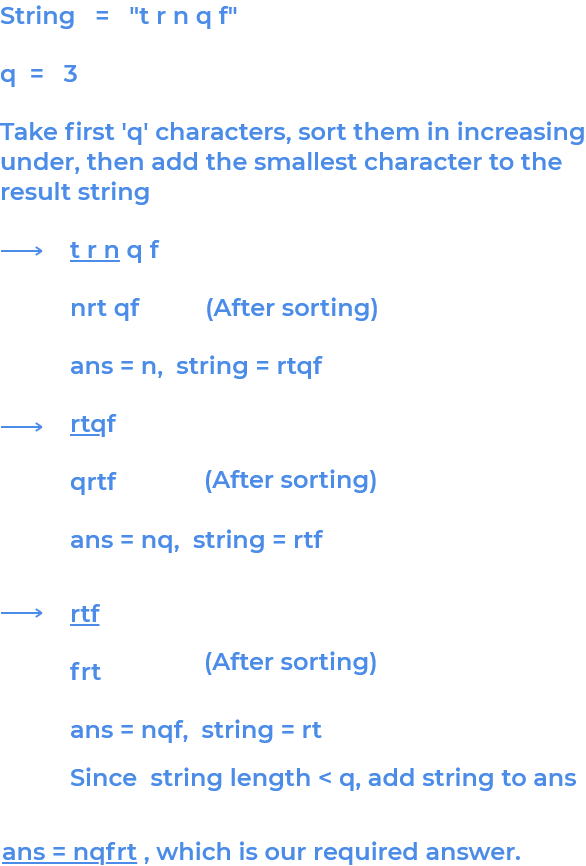Last Updated on March 30, 2022 by Ria Pathak

Concepts Used
Heap
Difficulty Level
Medium
Problem Statement :
Given a string str and an integer q. We have to generate a string S such that it is lexicographically smallest possible, by perform following operations:
- Take any character from the first
qcharacters ofstr. - characters of
strand append it toS. - Remove the chosen character from
str. - Repeat the above steps while there are characters left in
str.
See original problem statement here
Solution Approach :
Introduction :
Idea is to create a min-heap of characters of size
q. Each time we extract a character from our heap and add it tos, we insert a new character from the stringstrto the heap until the stringstrnot empty.
Method 1 :
We can sort the first
qcharacters of the string and pick the smallest one and append it tos. Now sort the nextqcharacters append the smallest one tos. Repeat the process untill the string is empty.
Method 2 :
We need to geneate a min heap of characters of size q.
- In a min-heap, the root always stores the smaller value as compared to its left & right subtree, this condition needs to be true for every node. We need to insert each item one by one such that it’s parent is always smaller than the item itself. If the parent is greater, then we need to swap the current item with its parent.
- We will insert first
qcharacters fromstrto the heap. Now we will extract a character and print it , and insert a new character fromstr.- We will stop once we have inserted all the characters from
strto the heap.- Finally, we will extract the characters left in our heap and print.
extract(): Removes the minimum element from Min-Heap. Time Complexity of this Operation is O(Logn) as this operation needs to maintain the heap property (by calling heapify()) after removing root.
heapify(): Maintains the heap property for each node. If any node does not follow heap property it swaps the node with the node which is smaller, or greater (in case of max-heap), than the node.
Below is the algorithm of above approach.
Algorithms :
Insert() :
- Insert the item at the last index, and increment the size by 1.
- Then, check if the inserted item is smaller than its parent,
- If yes, then swap the inserted item with its parent.
- If no, then do nothing.
- Now, go to step
2and repeat untill we reach root (first element).
Extract() :
- Store the value of the first node of our heap (
temp = heap[0]).- Replace the root node with the farthest right node (last element).
- Decrease the size by
1.(heap[0] = heap[size-1])- Perform heapify starting from the new root.
- Return the stored value.(temp)
Heapify () :
if the heap property holds true then you are done.
else if
the replacement node value <= its parent nodes value
then swap them, and repeat step 3.else
swap the replacement node with the smallest child node, and
repeat step 3.
Example:

Solutions:
#include <bits/stdc++.h>
using namespace std;
int parent(int i)
{
return (i-1)/2;
}
int left(int i)
{
return (i*2)+1;
}
int right(int i)
{
return (i*2)+2;
}
void swap(char *a,char *b)
{
char temp = *a;
*a = *b;
*b = temp;
}
void insert(char heap[],int *size, int val)
{
heap[*size]= val;
int i = *size;
(*size)++;
while(i!=0 && heap[parent(i)]>heap[i])
{
swap(&heap[parent(i)],&heap[i]);
i = parent(i);
}
}
void heapify(char heap[],int i,int size)
{
int l = left(i);
int r = right(i);
int s = i;
if(l<size && heap[l]<heap[i])
s = l;
if(r<size && heap[r]<heap[s])
s = r;
if(s!=i)
{
swap(&heap[i],&heap[s]);
heapify(heap,s,size);
}
}
char extract(char heap[],int *size)
{
char root = heap[0];
heap[0] = heap[*size-1];
(*size)--;
heapify(heap,0,*size);
return root;
}
int main()
{
int t;
cin>>t;
while(t--)
{
string s;
int q, size=0;
cin>>s;
cin>>q;
int n = s.length();
char *heap = (char *)malloc(sizeof(char)*n);
int i = 0;
for(int j=0;j<q;j++)
{
insert(heap,&size,s[j]);
i = j+1;
if(i==n)
break;
}
while(i<n)
{
cout<<extract(heap,&size);
insert(heap,&size,s[i]);
i++;
}
while(size)
{
cout<<extract(heap,&size);
}
cout<<endl;
}
return 0;
}
import java.util.*;
import java.io.*;
public class Main {
static int size;
static int count;
static String s="";
public static void main(String args[]) throws IOException {
Scanner sc = new Scanner(System.in);
int t=sc.nextInt();
for(int j=0;j<t;j++)
{
size=0;
s="";
String str=sc.next();
char heap[]=new char[str.length()+1];
int len=str.length();
int k= sc.nextInt();
for(int i=0;i<k;i++)
{
insert(heap,str.charAt(i));
}
delete(heap);
for(int i=k;i<len;i++)
{
insert(heap,str.charAt(i));
delete(heap);
}
for(int i=0;i<k-1;i++)
{
delete(heap);
}
System.out.println(s);
}
}
static void insert(char heap[],char data)
{
heap[++size]=data;
int temp=size;
while(temp>1&&heap[temp/2]>heap[temp])
{
swap(heap,temp,temp/2);
temp=temp/2;
}
}
static void minheapify(char heap[],int i)
{
if(size==0)
return;
if(i>size/2&&i<=size)
return;
int left=2*i;
int right=2*i+1;
if(right<=size)
{
if(heap[left]>=heap[i]&&heap[right]>=heap[i])
return;
}
else
{
if(heap[left]>=heap[i])
return;
}
int smallest;
if(left<=size&&heap[left]<heap[i])
{
smallest=left;
}
else
smallest=i;
if(right<=size&&heap[right]<heap[smallest])
smallest=right;
if(smallest!=i)
{
swap(heap,smallest,i);
}
minheapify(heap,smallest);
}
static void swap(char heap[],int i,int j)
{
char temp=heap[i];
heap[i]=heap[j];
heap[j]=temp;
}
static void delete(char heap[])
{
s=s+ heap[1];
heap[1]=heap[size];
size=size-1;
minheapify(heap,1);
}
}
[forminator_quiz id="1668"]
This article tried to discuss the concept of heap. Hope this blog helps you understand and solve the problem. To practice more problems on heap you can check out MYCODE | Competitive Programming.


